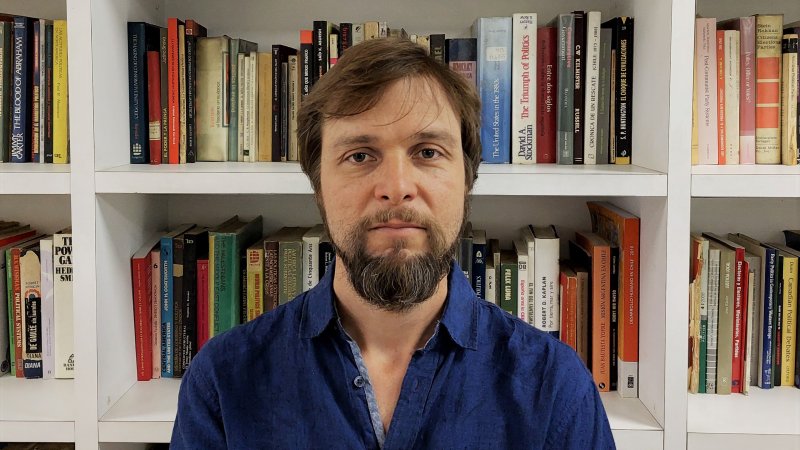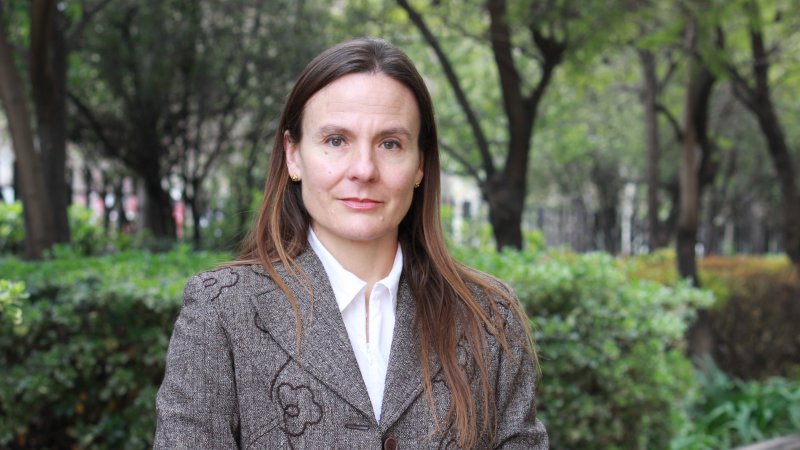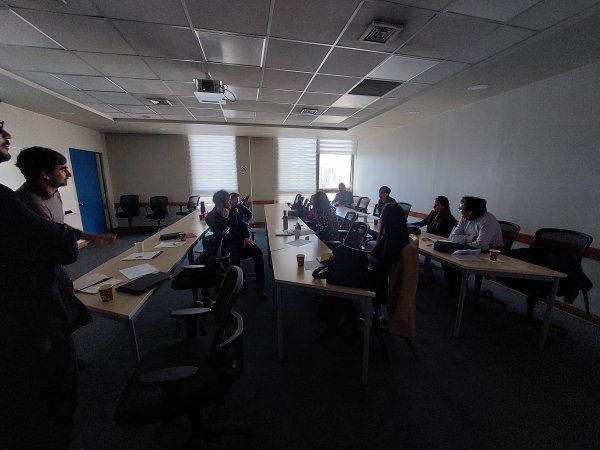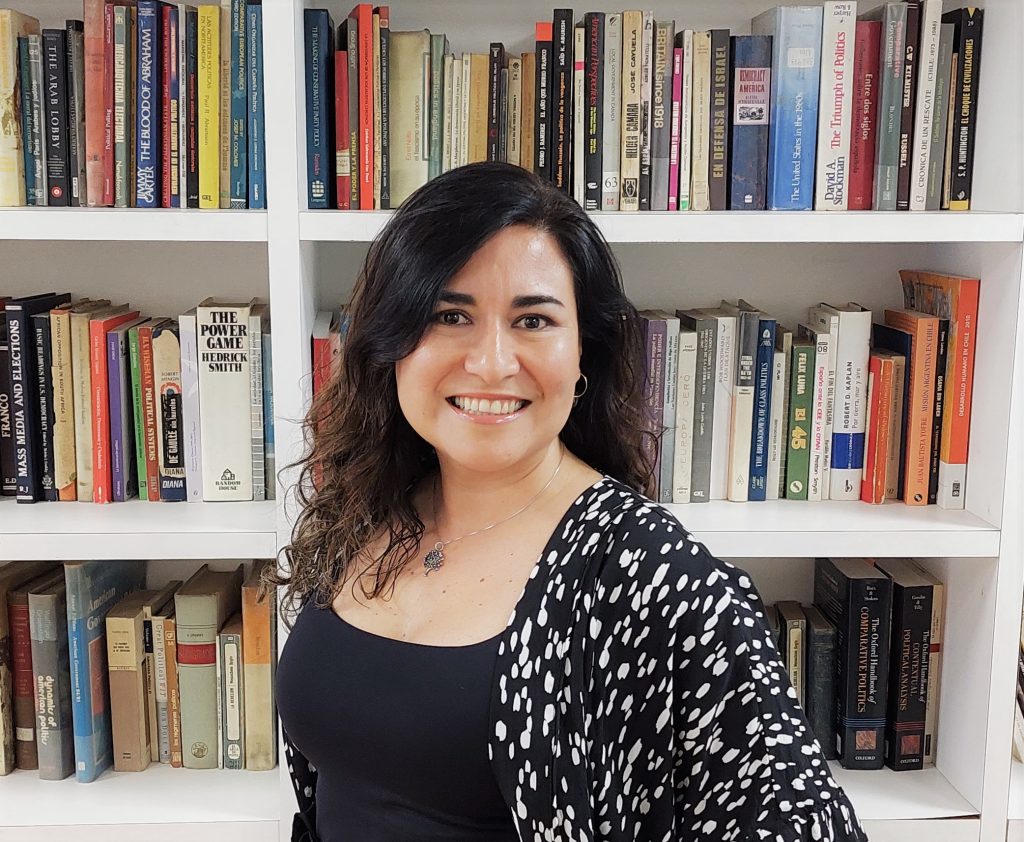Investigador Ignacio Schiappacasse presentará ponencia en la X Conferencia Internacional del COES

El investigador Ignacio Schiappacasse, perteneciente al Instituto de Investigación y Postgrado de la Facultad de Economía, Gobierno y Comunicaciones, así como al grupo Max Planck-UCentral, será uno de los exponentes en la X Conferencia Internacional del Centro de Estudios de Conflicto y Cohesión Social (COES). El también académico participará en la mesa de discusión titulada “Conflictos socioterritoriales y/o socioambientales”, la cual se llevará a cabo este jueves 9 de noviembre. Su participación está programada para el horario comprendido entre las 14:40 y las 16:20 horas. Durante su intervención, Schiappacasse presentará la ponencia titulada “Conflictos sociales en torno al uso de los recursos hídricos en Chile: el papel de los movimientos sociales y el poder empresarial”. En esta ponencia, el investigador compartirá sus hallazgos y análisis sobre los conflictos que surgen en el país relacionados con el uso y acceso a los recursos hídricos, poniendo especial atención en la influencia de los movimientos sociales y el poder de las empresas. En la presentación, junto al investigador de la Universidad Central se encontrarán Patricio Segura, representante de CODESA, y Joaquín Rozas, investigador de la Universitat Pompeu Fabra. La X Conferencia Internacional del COES se perfila como un evento para el análisis y la comprensión de los conflictos sociales en Chile y en el mundo.
Relationship between pollution levels and poverty: regions of Antofagasta, Valparaiso and Biobio, Chile
Herrera, Rojo & Scapini. (2022). Relationship between pollution levels and poverty: regions of Antofagasta, Valparaiso and Biobio, Chile. International Journal of Energy Production and 2022. Vol. 7. Iss. 2, 7(2), 176-184.
Meteorological, PM2.5 and PM10 factors on SARS-COV- 2 transmission: The case of southern regions in Chile
Scapini, Torres & (2023). Meteorological, PM2.5 and PM10 factors on SARS-COV- 2 transmission: The case of southern regions in Chile. Environmental Pollution. Volume 322.https://doi.org/10.1016/j.envpol.2022.120961
Disasters and housing infrastructure: Evidence from the 2010 chilean earthquake
Scapini & Vergara (2023) Book chapter: Earthquake Ground Motion. Chapter name: Disasters and housing infrastructure: Evidence from the 2010 chilean earthquake. IntechOpen. ISBN 978-0-85466-221-0. DOI: 10.5772/intechopen.1003006.
Investigadora publicó artículo en IntechOpen sobre costos de reconstrucción por el terremoto de 2010

“Desastres e Infraestructura de Viviendas: Evidencia del Terremoto de Chile en 2010”, se titula el artículo académico escrito por la integrante del Instituto de Investigación y Postgrado de la Facultad de Economía, Gobierno y Comunicaciones, y su grupo ESOC Max Planck-UCentral, Valeria Scapini, en conjunto con Cinthya Vergara, académica del Departamento de Ingeniería Industrial de la Universidad de Chile, que fue recientemente publicado en IntechOpen. El estudio proporciona un análisis detallado de los efectos del terremoto que azotó a Chile en el año 2010. Mediante datos recopilados a través de la encuesta Casen posterior al terremoto de 2010, se examinó el daño a las viviendas, los determinantes del costo de reconstrucción y cómo los hogares financiaron dicha reconstrucción. Los resultados revelan que las viviendas ubicadas más cerca del epicentro del terremoto fueron las más afectadas. Además, se encontró que el daño aumentaba cuando los techos y las paredes estaban en peor estado o construidos con materiales más vulnerables. Mientras, los costos de reconstrucción se relacionan con el grado de destrucción, la distancia al epicentro, el estado de las paredes antes del evento y el valor de la vivienda. En cuanto a la financiación de la reconstrucción, se observó que las provincias con más sucursales bancarias están asociadas con un menor costo de reconstrucción. El crédito bancario se utiliza con mayor frecuencia para reconstruir en áreas urbanas, cuando el jefe del hogar tiene más años de educación y cuando el costo de reparación es más alto. Por otro lado, los ahorros propios se utilizan cuando no hay seguro, el ingreso del jefe de hogar es mayor y los costos de reparación son más bajos. Por último, los subsidios se presentan como una opción cuando no hay seguro, el costo de reparación es más alto y para hogares de bajos ingresos, personas de edad avanzada y menor nivel educativo. IntechOpen es una plataforma de acceso abierto que brinda a los investigadores la oportunidad de acceder fácilmente a artículos académicos, promoviendo la colaboración, el descubrimiento y el progreso científico. Su enfoque centrado en las necesidades académicas y su comunidad de autores y editores de renombre internacional hacen de IntechOpen una plataforma confiable y valiosa para la difusión y el acceso a la investigación científica. Para acceder al artículo completo, puedes hacer clic acá.
Investigador participará en conferencia Internacional del COES

En la X Conferencia Internacional del COES estará participando Gabriel Chouhy, integrante del Instituto de Investigación y Postgrado de la facultad y del ESOC-UCentral, como panelista en la mesa “Crisis política, democratización y cambio constitucional: Chile en perspectiva comparada” a realizarse el día miércoles 8 de noviembre. El académico expondrá la ponencia “Roads to dictatorship and democratization revisited: critical antecedents and constitutional change during military rule in Uruguay and Chile”, que propone rexaminar las condiciones previas al golpe desde la perspectiva de la sociología histórico-comparada. En base a literatura secundaria, sostiene que los diversos caminos hacia la dictadura experimentados en Uruguay y Chile importan en tanto “antecedentes críticos” de la capacidad y determinación de los militares para asegurar la instalación de constituciones autoritarias. Así, la investigación apunta a que “el éxito o el fracaso en la constitucionalización de los regímenes autoritarios moldearon los pactos de transición que luego allanarían el camino hacia la redemocratización. La actual brecha de legitimidad e inclusión entre las democracias uruguaya y chilena se debe en gran medida a la divergencia histórica forjada durante esta ‘coyuntura crítica’. Por lo tanto, reexaminar los antecedentes de esa coyuntura es de crucial importancia”. Chouhy es doctor y magister por la Universidad de Pittsburgh, también diplomado en Análisis Sociodemográfico y licenciado en Sociología de la Universidad de la República, Uruguay. Antes de su ingreso a la Universidad Central, fue investigador en el Instituto de Educación del University College London, investigador postdoctoral en Estudios Latinoamericanos en la Universidad de Tulane en Nueva Orleans, e investigador doctoral de la Academia Nacional de Educación de EEUU.
Exitoso seminario de investigación abordó las complejidades del endeudamiento en Chile

Los problemas que causan el endeudamiento, factores que inciden en esto y cómo se trata de un fenómeno que va más allá de lo económico, fueron algunos de los temas que se analizaron en el seminario “Estudios sociales de la deuda y las tecnologías financieras en Chile”, realizado hace unos días. La actividad fue organizada por el director del Instituto de Investigación y Postgrado de la Facultad de Economía, Gobierno y Comunicaciones (FEGOC), y su grupo ESOC Max Planck-UCentral, Felipe González; y por José Ossandón, académico e investigador del Copenhagen Business School. El evento, además, se desarrolló en el contexto de una colaboración entre el grupo y el proyecto “Post-pandemic Poverty: Debt and the Feminisation of Finance in Marginal Sites”, que es financiado por el Independent Research Fund Denmark. El seminario contó con exposiciones de investigadores de distintas universidades: por ejemplo, el tema “¿Y qué más puedo hacer? Si ya no se puede gastar menos. Estrategias de hogares de sectores medios en Chile para afrontar la inflación”, lo presentaron Lorena Pérez Roa (Trabajo Social, Universidad de Chile), Alejandro Marambio Tapia (Sociología, Universidad Católica del Maule) y Gabriela Azocar de la Cruz (Trabajo Social, Universidad de Chile). Otra exposición fue de Matías Gómez, integrante del instituto de la FEGOC, quien habló del tema “La deuda de los otros: hacia una exploración sociológica de las actitudes y percepciones sobre el uso de créditos de las red de relaciones y los grupos de referencia”. En su presentación, explicó que “es importante avanzar en comprender no solo de las experiencias individuales, sino cómo los sujetos observan las prácticas que hacen otras personas para entender qué hacen ellos”.
Investigadora Gabriela Zapata es académica visitante del instituto UNU-WIDER

Desde fines de agosto y hasta noviembre 2023 la integrante del Instituto de Investigación y Postgrado de la Facultad de Economía, Gobierno y Comunicaciones, Gabriela Zapata, quien también es parte del Esoc-UCentral, se encuentra en Helsinki, Finlandia, como académica visitante del Instituto de Investigación en Economía del Desarrollo de la Universidad de las Naciones Unidas UNU-WIDER. Durante este período, desarrollará la investigación “Efectos de la maternidad en las trayectorias laborales de las mujeres y las brechas de género en Chile”. Utilizando el enfoque de estudio de eventos y datos de la Encuesta de Protección Social (EPS), este trabajo tiene como objetivo estimar el impacto de la maternidad en los resultados laborales de las mujeres y su efecto las desigualdades de género. Nos interesa investigar en qué medida las normas de género y los antecedentes familiares contribuyen a la penalización por maternidad, así como los factores que pueden mitigarla o exacerbarla. Esta investigación se enmarca además en las actividades del Núcleo de Autonomías de Género NIAG, proyecto InES Género UCentral. Los resultados preliminares de la investigación desarrollada en esta visita serán presentados el 15 de noviembre en la Serie de Seminarios de UNU WIDER, que se desarrollará en forma híbrida entre las 9:00-10:00 hrs. de Santiago, Chile (15:00-16:00 hora de Helsinki). Más información e inscripciones en este link. Sobre UNU-WIDER UNU WIDER tiene como misión la investigación y análisis de políticas públicas sobre desarrollo económico en temas de pobreza, desigualdad, desarrollo inclusivo, entre otros, con el objetivo de promover un desarrollo sostenible y equitativo para todos. UNU WIDER inició sus operaciones hace más de 30 años en Helsinki, Finlandia, como el primer centro de investigación de la Universidad de las Naciones Unidas. Hoy en día es una combinación única de grupo de expertos, instituto de investigación y agencia de las Naciones Unidas, que ofrece una gama de servicios que van desde asesoramiento sobre políticas a los gobiernos hasta investigaciones originales disponibles gratuitamente. Como una forma de ampliar su ámbito de acción y contribuir a la formación de competencias investigativas en profesionales de distintos países del mundo, UNU WIDER cuenta con un programa de Académicos Visitantes. Este programa brinda a académicos calificados la oportunidad de investigar temas relacionados con el desarrollo económico y problemas globales, además de participar en actividades de UNU-WIDER. Los académicos suelen pasar un período de dos a tres meses en las oficinas de UNU-WIDER en Helsinki. Durante este tiempo preparan uno o más artículos académicos que se considerarán para su publicación en la serie de artículos de trabajo WIDER y presentan un seminario en su área de investigación (más información acá).
Seminar Program “Social studies of debt and financial technologies in Chile”.

Date:Wednesday, September 27, 2023. Venue: Research and Postgraduate Research Institute, School of Economics, Government and Communications, Universidad Central. Santa Isabel 1278, Room 67, VKII building. Organizers: Felipe González (Universidad Central de Chile) & José Ossandón (Copenhagen Business School). Event developed in the context of a collaboration between the Max Planck – UCEN Group for Research in Economics and Society and the project “Post-pandemic Poverty: Debt and the Feminisation of Finance in Marginal Sites”, funded by the Independent Research Fund Denmark. Program and abstracts Registration here. Program 8.30 Welcome coffee 9.00 – 10:30. First session – And what else can I do? If you can no longer spend less. Strategies of middle-income households in Chile to cope with inflation. Lorena Pérez Roa (Social Work, Universidad de Chile), Alejandro Marambio Tapia (Sociology, Universidad Católica del Maule) and Gabriela Azocar de la Cruz (Social Work, Universidad de Chile). – The debt of others: towards a sociological exploration of attitudes and perceptions about the use of credit from relationship networks and reference groups. Matías Gómez (Sociology P. Universidad Católica & Research Institute of Economics, Government and Communications, Universidad Central) 10:30 Coffee break 11:00 – 12:30. Second session – Financial oikonomization: the financial government and administration of the household. José Ossandón (Department of Organization, Copenhagen Business School), Joe Deville (Department of Organisation, Work and Technology and the Department of Sociology, Lancaster University), Jeanne Lazarus (Centre de sociologie des Organisations, Sciences-Po-CNRS), Mariana Luzzi (Escuela Interdisciplinaria de Altos Estudios Sociales, Universidad Nacional de San Martín, CONICET) (Presentation in Spanish) – Entrepreneurship as therapy: learning to fail and care through micro-entrepreneurship in Santiago, Chile. Piergiorgio Di Giminiani (Anthropology, P. Universidad Católica de Chile) and Constanza Quezada (Anthropology, Pontificia Universidad Católica de Chile) 12:30 Lunch 13:00 – 14:30. Third session – “Papito corazón”: exploring the economic disadvantages of being head of household of popular sectors in Santiago, Chile. Lorena Pérez Roa (Social Work, Universidad de Chile) and Rocío Gallardo (Social Work, Universidad de Chile). – Consumer credit and personal networks. Exploring the role of network socioeconomic heterogeneity in consumption and indebtedness. Felipe González (Grupo Max Planck – UCEN de Investigación en Economía y Sociedad, Instituto de Investigación de Economía, Gobierno y Comunicaciones, Universidad Central), Gabriel Otero (Grupo Max Planck – UCEN de Investigación en Economía y Sociedad, Instituto de Investigación de Economía, Gobierno y Comunicaciones, Universidad Central), Matías Gómez ((Grupo Max Planck – UCEN de Investigación en Economía y Sociedad, Instituto de Investigación de Economía, Gobierno y Comunicaciones, Universidad Central & Sociología, P. Universidad Católica). 15:00 Closing and social activity
Programa Seminario “Estudios sociales de la deuda y las tecnologías financieras en Chile”

Fecha:Miércoles 27 de septiembre, 2023. Lugar: Instituto de Investigación de investigación y postgrado, Facultad de Economía, Gobierno y Comunicaciones, Universidad Central. Santa Isabel 1278, Sala 67, edificio VKII. Organizan: Felipe González (Universidad Central de Chile) & José Ossandón (Copenhagen Business School). Evento desarrollado en el contexto de una colaboración entre el Grupo Max Planck – UCEN de Investigación en Economía y Sociedad y el proyecto “Post-pandemic Poverty: Debt and the Feminisation of Finance in Marginal Sites”, financiado por el Independent Research Fund Denmark. Programa y resúmenes Inscripciones aquí. Programa 8.30 Café de bienvenida 9.00 – 10:30. Primera sesión • ¿Y qué más puedo hacer? Si ya no se puede gastar menos. Estrategias de hogares de sectores medios en Chile para afrontar la inflación. Lorena Pérez Roa (Trabajo Social, Universidad de Chile), Alejandro Marambio Tapia (Sociología, Universidad Católica del Maule) y Gabriela Azocar de la Cruz (Trabajo Social, Universidad de Chile) • La deuda de los otros: hacia una exploración sociológica de las actitudes y percepciones sobre el uso de créditos de las red de relaciones y los grupos de referencia. Matías Gómez (Sociología P. Universidad Católica & Instituto de Investigación de Economía, Gobierno y Comunicaciones, Universidad Central) 10:30 Café 11:00 – 12:30. Segunda sesión • Financial oikonomization: the financial government and administration of the household. José Ossandón (Department of Organization, Copenhagen Business School), Joe Deville (Department of Organisation, Work and Technology and the Department of Sociology, Lancaster University), Jeanne Lazarus (Centre de sociologie des Organisations, Sciences-Po-CNRS), Mariana Luzzi (Escuela Interdisciplinaria de Altos Estudios Sociales, Universidad Nacional de San Martín, CONICET) (Presentación en español) • Emprendimiento como terapia: aprender a fracasar y cuidar a través del microemprendimiento en Santiago, Chile. Piergiorgio Di Giminiani (Antropología, P. Universidad Católica de Chile) y Constanza Quezada (Antropología, Pontificia Universidad Católica de Chile) 12:30 Almuerzo 13:00 – 14:30. Tercera sesión • “Papito corazón”: explorando las desventajas económicas de ser jefa de hogar de sectores populares en Santiago de Chile. Lorena Pérez Roa (Trabajo Social, Universidad de Chile) y Rocío Gallardo (Trabajo Social, Universidad de Chile). • Crédito de consumo y redes personales. Explorando el rol de la heterogeneidad socioeconómica de las redes en el consumo y endeudamiento. Felipe González (Grupo Max Planck – UCEN de Investigación en Economía y Sociedad, Instituto de Investigación de Economía, Gobierno y Comunicaciones, Universidad Central), Gabriel Otero (Grupo Max Planck – UCEN de Investigación en Economía y Sociedad, Instituto de Investigación de Economía, Gobierno y Comunicaciones, Universidad Central), Matías Gómez (((Grupo Max Planck – UCEN de Investigación en Economía y Sociedad, Instituto de Investigación de Economía, Gobierno y Comunicaciones, Universidad Central & Sociología, P. Universidad Católica). 15:00 Cierre y actividad social


 600 582 2222
600 582 2222  admision@ucentral.cl
admision@ucentral.cl